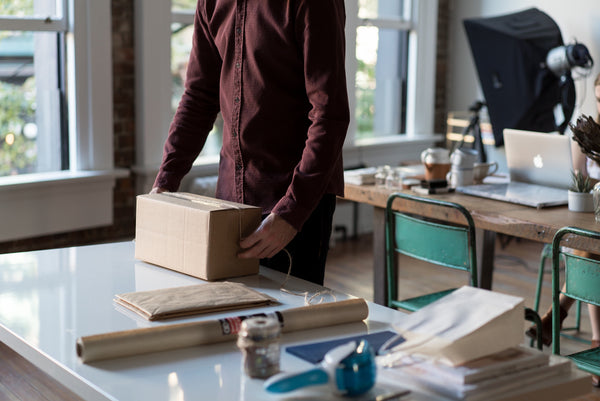When it comes to maintaining a healthy bottom line, returns may feel like a retailer’s kryptonite. But offering flexible shipping options, like click and collect, can minimize the need for returns and exchanges and keep sales strong.
In-store pickup (also known as click-and-collect) lets online shoppers choose in-store pickup as a delivery method at checkout. This is especially beneficial because they not only get orders faster, but save on shipping costs as well.
Ordering online and collecting in store is big business in commerce. By letting a customer check size, color, and shape before walking out and upselling at the same time, thousands of stores are decreasing returns and selling more, all while offering highly valued flexibility.
Last year in the UK, more than half of online shoppers used it, and the U.S. is not far behind, where almost a third of online holiday purchases were made via store pickup.
In total since 2011, the use of click and collect in the UK is up about 155%, and last Christmas was 27% compared to the year before. That’s three times faster than online shopping growth overall.
And with the increasing popularity of this shipping option, the more customers place trust brands. Year after year, orders using store pickup increase closer to the Christmas shopping season. During the hectic holiday shopping blitz, more people are using it with the confidence that they’ll be able to get their gifts in time.
A Brief History of Game-Changing Shipping Options
 Based on those stats, click and collect is obviously here to stay. Like the way that Amazon changed customer expectations when it began offering free delivery, the ability to order online and pickup in store whenever it’s convenient has become an expectation for tech-savvy shoppers. Free delivery became a key differentiator for retailers, and one that could make or break a sale.
Based on those stats, click and collect is obviously here to stay. Like the way that Amazon changed customer expectations when it began offering free delivery, the ability to order online and pickup in store whenever it’s convenient has become an expectation for tech-savvy shoppers. Free delivery became a key differentiator for retailers, and one that could make or break a sale.
With advancing technology, we’ve also seen the growth in same-day delivery, which is another industry game changer. Where this option is implemented well, it changes customer expectations for online shopping experiences — and those retailers who don’t offer flexibility risk falling behind by their competitors who do.
With the rapidly growing number of options for getting a product into a customer’s hands, it’s becoming more apparent that in-store pickup is the next “free delivery” of the retail world, and will permanently change customer expectations. In other words, adding flexibility to your offer is becoming less of a nice-to-have, and more of a must-have. Research from the Wall Street Journal shows that about 50% of shoppers surveyed opted for in-store pickup, and 45% of those consumers purchased something else during their trip to the store.
That’s why there’s business sense in offering an additional shipping option, particularly click and collect. Right now, it’s a competitive advantage that can act as a differentiator for your business and increase in-store foot traffic and upselling. There’s a good argument to invest now and get ahead of the trend, rather than being forced to make the investment down the line anyway in order to play catch-up.
When it comes to the return on your investment, it’s important to implement in-store pickup effectively, and of course you’ll want to know whether it was worth it. Seek out customer feedback once they experience your pickup option to iron out any kinks and make the process as seamless as possible. Track how many customers come in to collect their product, and then monitor how many bought something else at the same time. If those numbers are high, you know you’re onto a winner and it’s worth continually expanding this offering.
You can use your point-of-sale system, inventory management software, and/or your other sales fulfillment tools to keep an eye on these metrics.
To help increase conversions on your website, learn how to build a clickable call to action button.
The Benefits of Offering In-Store Pickup
 So, why is click and collect so popular? If you think about it, it’s the best of both worlds for merchants and customers alike. Customers can enjoy all the best bits of online shopping, with the benefits of a real store transaction. No wonder people like it.
So, why is click and collect so popular? If you think about it, it’s the best of both worlds for merchants and customers alike. Customers can enjoy all the best bits of online shopping, with the benefits of a real store transaction. No wonder people like it.
Convenience for Mobile Shoppers
It’s perfect for busy mobile shoppers who can order something at lunchtime and pick it up on the way home. Also, even the most enthusiastic shopper probably doesn’t relish the weekly grocery shop, which is why more supermarket customers are taking advantage of this option.
If you sell a hot commodity and your customers come back regularly, they might love the chance to skip any long queues. Retailers could find that the added flexibility turns occasional customers into regular ones.
Third-party pickup location services are booming as well, whether that’s a local post office or a locker at a train station. Smaller retailers can now add potentially thousands of pickup locations to make accessing their products even more convenient for customers.
In the UK, just over half of online shops offer click and collect, but only a third of those have a local delivery tie-in, and that’s an opportunity that’s worth looking exploring.
Removing the Possibility of Damaged Goods
Click and collect is also ideal for bakeries, florists, and retailers selling delicate or perishable items. By offering in-store pickup, the risk of damage in transit is taken out of the equation — which is great for the bottom line as well as customer satisfaction. In the past, a customer would have to call up to arrange collection, but now it can be available natively during the checkout process.
Reducing Returns and Exchanges
Now let’s drill down a bit. The biggest growth sectors for pickup are clothes and shoes. From a customer’s point of view, that makes perfect sense. By picking up when it’s convenient, it’s possible to check the color of the thing you’ve bought matches the product shot online, and while you’re there, you might try it on quickly to make sure it fits.
If it’s not quite right, you can ask for a swap there and then. Now let’s look at that from the retailer’s perspective. That is a significant opportunity to reduce your return rate because you make sure the customer has the right product in their hands before they walk out of your store.
In-Store Sales: An Opportunity for Upselling
In addition to all the benefits listed above, there’s also a tremendous potential for upselling. About 40% of customers collecting an order buy something extra — about £13 (about USD$16.79) of additional purchases, in fact. At critical seasons, though, that number is much higher — 69% in the U.S. last Christmas.
The value proposition, then, is not just adding cost and complexity to your business so you can offer flexibility for your customers. Deployed well, you are reducing costs while also generating extra revenue.
What’s important to recognize here is that this isn’t just an occasional passive benefit: by putting emphasis on the pickup experience, you can maximize upselling opportunities.
How to Implement Click and Collect Shipping
What do merchants need to pay attention to? Well, getting the correct order ready at the agreed-upon time is a first step (although 10% of retailers in this study fell down in that area).
It’s well worth spending time with your team to make sure that pickups are seen as a core business activity, and treated with the same regard and professionalism as traditional sales. This can help ensure that customers don’t feel treated as an oddity.
Beyond getting the basics right, retailers can make improvements to the way they handle on-the-spot returns and upselling. Make sure that everyone on the team responsible for handling pickups is treated and rewarded in the same way as your regular team, particularly if you’d like them to add value through upselling.
Beyond your team members, where will customers collect their products? If shoppers pick up their purchases from the main checkout counter, merchants can benefit from the point-of-purchase displays you’ve put in place to entice shoppers at checkout. Selfridges offers 30 minutes free parking to collecting customers. Not only does this incentivize customers to use this shipping option, but it allows them a bit of extra time to browse while they’re in store. Can you offer any similar added benefits?
Many brands often also fall down when advertising their pickup options. It’s a shame to only mention it to customers during the checkout process. Shout about it from the proverbial rooftops. The more online customers you can encourage to use in-store pickup, the more opportunities for upselling and increasing customer satisfaction in the process. And of course, there’s the chance to build brand loyalty if those customers have a great experience collecting from you.
Have You Used Click and Collect Shipping Options?
What’s your experience with in-store pickup? Share your tips and advice in the comments below.

About The Author
Andrew Cargill is the founder of Zapiet, a pickup and delivery app merchants can find on the Shopify App Store. A long-time Shopify champion, Andy co-founded a web development agency in 2011 that specialized in ecommerce before he began building apps.
Read more
- How to Deal With Retail Returns Professionally and Profitably
- Lightspeed vs Shopify POS: The Best of All Lightspeed Alternatives
- How To Integrate Your Point of Sale With Shopify
- 5 Strategies to Future Proof Your Brick-and-Mortar Store
- How Retail Store Owners Can Optimize Their Mobile Presence
- 18 Signs It’s Time to Switch POS System Providers
- Chatbots for Retail: What Are They and How Retailers Can Use Them to Spark Sales
Reduce Product Returns FAQ
What is a good return rate for a product?
What are the reasons to return a product?
- Defective or damaged product
- Wrong product received
- Wrong size or color
- Unsatisfactory quality
- Changed mind
- Unclear product description
- Product arrived too late
- Unhappy with customer service





